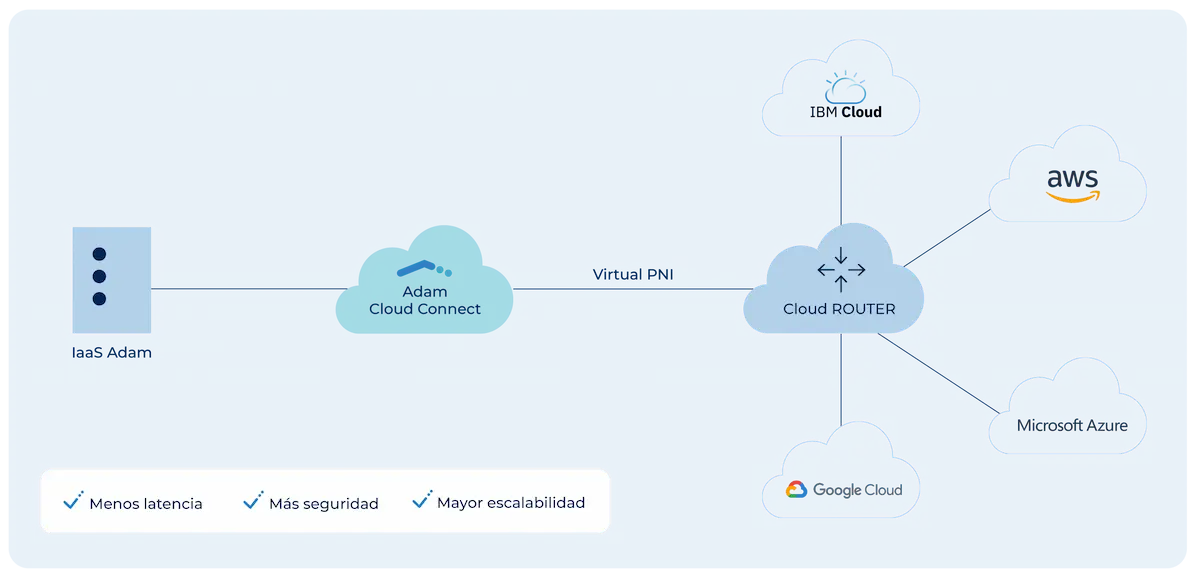More and more companies are turning to hybrid or multi-cloud architectures to gain flexibility, distribute workloads, and avoid dependency on a single provider. However, as these environments grow and diversify, maintaining efficient and secure connectivity becomes a challenge.
Virtual routing services —known as cloud routers— make it possible to connect different platforms (such as AWS, Azure, Google Cloud, or on-premise infrastructures) without the need for physical hardware or reliance on the public Internet. Cloud ROUTER, the service developed by DE-CIX, has become the benchmark standard in this field and is available through different providers, including Adam.
This article outlines the most relevant factors when selecting a Cloud ROUTER service for your organisation and highlights the added value of contracting it through Adam.
Security: what guarantees does Cloud ROUTER offer?
Security cannot be an optional add-on; it must be embedded in the service design. Cloud ROUTER manages data traffic between multiple cloud environments, so it is essential to check how this traffic is protected, who has access to it, and where it is stored.
A reliable service should run on private networks, ensure traffic isolation, and be backed by data centres that comply with standards such as ISO 27001 or the National Security Framework (ENS). It is also advisable that it includes active DDoS mitigation, a threat that is increasingly common in distributed environments.
Cloud ROUTER performance and reliability
An organisation’s operational efficiency depends largely on the performance of its connectivity. In distributed environments —where one provider may host the databases and another the business logic— network stability and latency are critical.
Service Level Agreements (SLAs) should detail not only availability and maximum latency, but also how reliability is guaranteed in practice. Redundant infrastructure, alternative routes, and regional availability are essential to maintaining continuity even in critical situations.
Scalability: how Cloud ROUTER grows with your business
One of Cloud ROUTER’s advantages over traditional solutions is its ability to adapt to changing needs. Instead of relying on physical hardware or fixed links, it allows bandwidth to be increased or reduced according to actual demand.
This is particularly useful during product launches, mergers, or seasonal traffic peaks. The ability to scale from, for example, 1 Gbps to 10 Gbps without interruption reduces the risk of over-provisioning and provides operational flexibility. It is therefore important to check whether the service offers incremental scalability and what provisioning timelines are in place.
Data centre location
The proximity of interconnection points has a direct impact on latency, applicable regulations, and data sovereignty. The closer the node, the faster the response time. And if the node is within the same legal framework —such as the European Union— compliance requirements are simplified.
In regulated sectors such as banking, healthcare, or public administration, this is particularly critical. Well-established interconnection platforms such as DE-CIX, with presence in multiple regions and direct access to major cloud providers, help ensure optimised routing and traffic stability.
Technical support and expertise
In a service like Cloud ROUTER, where connectivity underpins critical applications, support is as important as the technology itself. An unresolved incident can have a direct impact on business continuity.
For this reason, it is essential to have a support team available 24/7, with proven expertise and guaranteed response times. The proximity and technical knowledge of the provider can also make a decisive difference in processes such as activating new routes, resolving urgent incidents, or modifying configurations.
Compatibility with multi-cloud and hybrid environments
Each organisation designs its cloud strategy differently: some rely solely on public clouds, others maintain on-premise infrastructure, and many combine both. Cloud ROUTER must adapt to any of these scenarios without requiring the customer to redesign their architecture.
Compatibility with AWS, Azure, and Google Cloud is essential, but equally important is the ability to connect directly with local environments or private clouds. This flexibility enables hybrid architectures, phased migrations, and deployments across multiple regions.
Portability and neutrality
The ability to move data between providers is often underestimated —until it becomes necessary. If technical or contractual restrictions are imposed, the service can become a barrier in the medium term.
It is therefore advisable to choose neutral providers that use standard protocols and allow direct routes to multiple platforms. This reduces excessive dependencies and lowers the costs of future migrations.
Costs: transparency and forecasting
The cost of a Cloud ROUTER service goes beyond the monthly fee. There may be additional charges for data egress, new connections, or advanced support. A detailed estimate, with no hidden terms, is essential to align the budget with operational reality.
Transparency in this area not only facilitates comparison between providers but also prevents unpleasant surprises in projects where traffic between clouds is constant.
Regulatory compliance
In distributed architectures, regulatory and legal compliance is as critical as the technology itself. Cloud ROUTER must operate from certified data centres that adhere to frameworks such as GDPR, the National Security Framework (ENS), or ISO 27001.
In regulated sectors, the absence of such guarantees can create serious legal and reputational risks.
Provider reputation and track record
Beyond technical specifications, it is worth considering the provider’s track record, experience with similar projects, and neutrality with respect to specific platforms. In the field of interconnection, players like DE-CIX set an international benchmark for reach and reliability.
Choosing with technical and strategic criteria
Deciding to contract Cloud ROUTER is not just about connecting clouds. It affects security, operational efficiency, and the long-term evolution of infrastructure. Carefully evaluating the factors described above helps minimise risks and make more sustainable decisions.

How Cloud ROUTER optimises your connectivity with Adam
At Adam, we integrate Cloud ROUTER from DE-CIX into our connectivity ecosystem so you can enjoy private, secure, and flexible interconnection across multiple clouds and on-premise environments.
We add decisive value:
- Proximity and compliance: the service is provisioned from our own data centres in Barcelona and Madrid, certified with ISO 27001, ENS, and ISO 22301. This reduces latency and ensures data sovereignty.
- Specialised, local support: our in-house technical team is available 24/7 with immediate response capacity, without intermediaries.
- Real scalability: you can scale from 100 Mbps to 400 Gbps without physical hardware or restrictive contracts.
- Integration with other Adam services: Cloud Connect, DDoS protection, multi-operator interconnections, and IaaS combine to strengthen your infrastructure resilience.
This makes Cloud ROUTER not just a global interconnection point, but an integrated part of your technology strategy, supported by Adam’s expertise and local presence.
If you want to explore the technical details and see how Cloud ROUTER can be tailored to your infrastructure, you can download the full service datasheet on our website. detalles técnicos y ver cómo Cloud ROUTER puede adaptarse a tu infraestructura, puedes descargar la ficha completa del servicio en nuestra web.

This article has been written by
Adam